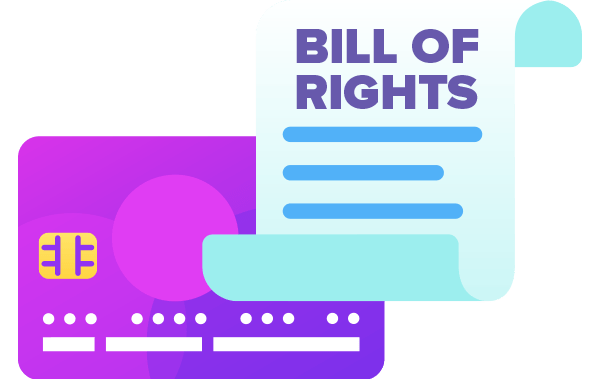Many rules and regulations affect what credit card companies can and cannot do. These governing principles have changed often throughout the years, with a significant amount of the regulatory adjustments being brought about by legal decree. In fact, the new credit card law (CARD Act) which went into full effect in August 2010 represents one of the most sweeping pieces of credit card legislation instituted in years. Therefore, to keep you apprised of all the changes, we have compiled what amounts to a credit card user’s bill of rights that clearly establishes consumer privileges as well as credit card company requirements and limitations in terms of various credit card features.
Interest Rates / APR's
- The interest rate on your credit card can only change under specific circumstances:
- You become 60 days delinquent (in which case all of your interest rates may rise to the Penalty APR).
- After the first 12 months of account opening, your credit card company sends you a notification stating that in 45 days a new interest rate will apply to any transactions made 14 days after the date of the notice (i.e. new transactions).
- In such a situation, the balance that you have on the 13th day of the notice (i.e. your existing balance) will not be subject to the higher interest rate. A credit card company can send you a notification about an interest rate increase for pretty much any reason, but since the interest rate on your existing balance is not affected you can simply stop using your credit card within 14 days of the date on the notification and avoid having any purchases be subject to the higher interest rate.
- Your interest rate is tied to a variable index and there is a change to the value of the index.
- The term of your introductory rate concludes.
- You do not follow the terms of a debt management agreement.
- Interest rates can only be applied to balances held during the current billing period (creditors were previously able to determine interest charges by calculating average daily balances for both the current and previous billing periods, which often made for higher interest rates being assessed).
- If your interest rate rises as a result of becoming 60 days delinquent you may request a reduction after making the next six consecutive payments on-time.
- Your request must be evaluated within 45 days.
Fees
- You cannot be subject to fees (excluding penalty fees) totaling more than 25% of your credit card’s initial limit during the first year your account is open. Unfortunately the 25% cap does not apply to fees assessed before your account is open.
- You cannot be charged a penalty fee in excess of $30 unless one of your last six payments was late (in which case a fee of up to $41 may apply), or your credit card company proves to regulators that costs brought about by the penalized action justify a higher penalty. However, no matter what…
- a late fee cannot exceed your minimum payment.
- you cannot be charged with an over-limit fee that is more than the amount by which you exceeded the limit.
- You cannot be charged more than one fee for any single event or transaction that warrants penalty (e.g. two different types of late fees for one missed payment—think the legal concept of double jeopardy).
- You cannot be assessed fees for account inactivity.
- You are liable for, at most, $50 if you card is lost or stolen.
Communications / Statements
- Credit card companies must disclose a card’s terms (APR, annual fee, interest-free periods, etc.) in writing.
- Credit card companies must provide at least 45 days notice before changing your account’s fee structure or interest rate and prior to making any other significant changes to your terms; however…
- Companies do not have to notify you before a variable interest rate changes, your introductory rate concludes and the regular rate begins, or your rate increases because you are not abiding by the terms of a debt management agreement.
- Once requisite notification of any change is provided, you have the right to cancel your card before increased fees are assessed though your credit card company may, in turn, revoke charging privileges and/or raise your monthly minimum payment in order for full balance payment in an expedited time frame.
- Your credit card company must explain the reasoning behind any interest rate increases.
- Credit card companies must denote clearly on your bill how long it will take to pay off your balance when only paying the minimum amount and how much you would have to pay monthly in order to be at zero balance within three years.
- Lenders must use uniform methods to calculate the cost of credit and must disclose this cost.
- You have the right to dispute payments.
- Disputes must be mailed and received by the credit card company within 60 days of the date on the account statement that included the initial potential error.
- Your credit card company must acknowledge the dispute within 30 days and either correct the mistake or send a letter explaining why there was no error within 90 days.
- You must expressly agree to allow purchases that exceed you credit limit.
- If you agree to allow over-limit transactions and end up exceeding your limit, your credit card company may assess only one fee per billing period
- You can choose to revoke the ability to exceed your limit at any time.
Payments
- The amount of your payment above the minimum payment must be applied to the balance with the highest interest rate.
- The minimum payment amount is applied to the balance with the lowest interest rate.
- If you made a purchase with a deferred interest rate (e.g. interest does not begin to accrue until a year after purchase) you may be given the choice of applying your monthly payments to this balance so you can pay it off before interest kicks in. If you are not given this option, your payments for the two billing periods prior the end of the no-interest period will be applied to this balance.
- Your credit card company must mail you your bill at least 21 days before it is due.
- Your credit card company must provide you with your bill at the same time each month.
- Payment cannot be required to be placed prior to 5 p.m.
- If your payment date falls on a holiday, you have until the day following the holiday to make payment.
- Mistakes on your bill must be corrected and may not damage your credit score.
- You have the right to dispute payments.
- Disputes must be mailed and received by the credit card company within 60 days of the date on the account statement that included the initial alleged error.
- Your credit card company must acknowledge the dispute within 30 days and either correct the mistake or send a letter explaining why there was no error within 90 days.
Credit Card Eligibility
- If you are under 21 years old you must exhibit payment ability (i.e. prove reliable income) or have a co-signer in order to open a credit card.
- Credit card companies must evaluate your income (includes household income that you have access to) prior to issuing you a credit card.
- You may not be discriminated upon based on sex, race, religion, marital status, age, or national origin.
- You may not be discriminated against because you receive public assistance.
- You cannot be issued an unsolicited credit card.
Debt Collection
- Debt collectors must identify themselves in every communication.
- Debt collectors must apprise you of your right to dispute your debt.
- Debt collectors must provide contact information for the creditor from whom the debt originates within 30 days of receiving a request for such information.
- Debt collectors must mail you verification of your debt or stop the collections process within 30 days of receiving a dispute or request for debt verification.
- Debt collectors may only call you between 8 a.m. and 9 p.m.
- Debt collectors may not use the telephone to intentionally annoy or harass you.
- Debt collectors may not attempt to contact you at work if your employer has forbidden the practice.
- Debt collectors may not use abusive or profane language.
- Debt collectors may not contact you after you have requested in writing that they not do so.
- Communications expressing the conclusion of collections efforts or the filing of a lawsuit are permitted.
- Debt collectors may not contact you if you have made it known that you are being represented by an attorney.
- Debt collectors may not misrepresent themselves or the extent of your debt.
- Debt collectors may not publish your name or address.
- Debt collectors may not threaten legal action that is not actually being contemplated.
- Debt collectors may not share information about your debt with third parties, excluding attorneys and your spouse.
- Debt collectors may not send you mail with any symbols or writing indicating that you are in debt collections.
- Debt collectors cannot relay or threaten to relay false information to credit reporting agencies.
- You have the right to sue debt collectors in state or federal court.
Credit Reports
- Consumers have the right to free copies of their credit reports from the three major credit reporting agencies every 12 months.
- Reports may be requested by phone or mail and at annualcreditreport.com.
- Negative information must be removed from your credit reports within a certain period of time.
- Most information must be removed within 7-10 years.
- If information on a credit report leads to adverse action against a consumer, the organization that used the information must notify the consumer of this fact and identify the source of the information.



WalletHub experts are widely quoted. Contact our media team to schedule an interview.